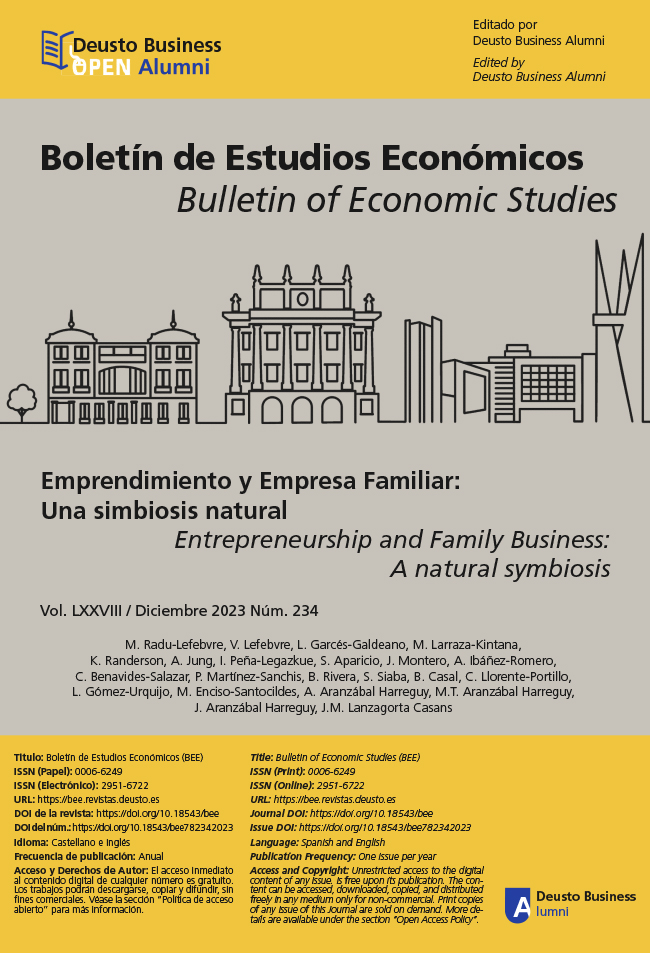La empresa familiar centenaria: algunas claves para su eterna supervivencia
Resumen
No son muchas las empresas familiares que logran superar el siglo de actividad mediante la transmisión de un patrimonio, tangible e intangible, que pasa de mano en mano durante más de cuatro o cinco generaciones en una familia. A falta de una teoría de la empresa familiar que pueda explicar por qué algunas empresas sobreviven eternamente mientras otras perecen en el camino, en este trabajo se aporta una reflexión parcial sobre el papel que desempeña el emprendimiento a la hora de contribuir a la renovación estratégica de la empresa familiar primigenia, y por lo tanto, a la ampliación de su longevidad.
Recibido: 28 de abril de 2023
Aceptado: 28 de junio de 2023
Citas
Arz, Ch. (2019). Bridging the micro-macro gap: A multi-layer culture framework for understanding entrepreneurial orientation in family firms. Journal of Family Business Strategy, 10 (2019), 100287. https://doi.org/10.1016/j.jfbs.2019.04.006
Awais, S. (2018). What have we learned? Themes from the literature on organizational culture in family firms. European Business Review, 30(6), 660-675. https://doi.org/10.1108/ebr-02-2017-0042
Capolupo, P., Ardito, L., Messeni Petruzzelli, A., and De Massis, A. (2022). Opening up the black box of family entrepreneurship across generations: A systematic literature review. International Small Business Journal, 1–40. https://doi.org/10.1177/02662426221127412
Carter, S., and Ram, M. (2003). Reassessing Portfolio Entrepreneurship. Small Business. Economics, 21, 371–380. https://doi.org/10.1023/A:1026115121083
Caspar, C., Dias, A.K., and Elstrodt, H.P. (2010). The five attributes of enduring family businesses. McKinsey Global Institute.
Chrisman, J.J., Chua, J.H., and Steier, L.P. (2003). An introduction to theories of family business. Journal of Business Venturing, 18(4), 441–448. https://doi.org/10.1016/s0883-9026(03)00052-1
Covin, J. G., and Lumpkin, G. T. (2011). Entrepreneurial orientation theory and research: Reflections on a needed construct. Entrepreneurship theory and practice, 35(5), 855-872. https://doi.org/10.1111/j.1540-6520.2011.00482.x
Discua Cruz, A., Hamilton, E., and Jack, S. L. (2012). Understanding entrepreneurial cultures in family businesses: A study of family entrepreneurial teams in Honduras. Journal of Family Business Strategy, 3(3), 147-161. https://doi.org/10.1016/j.jfbs.2012.05.002.
EY and University of St. Gallen (2023). Global Family Business Index 2023. https://familybusinessindex.com/
Gómez-Mejía, L. R., Cruz, C., Berrone, P., and De Castro, J. (2011). The Bind that Ties: Socioemotional Wealth Preservation in Family Firms. The Academy of Management Annals, 5(1), 653-707. https://doi.org/10.5465/19416520.2011.593320
Hanson, S. K., Hessel, H. M., and Danes, S. M. (2019). Relational processes in family entrepreneurial culture and resilience across generations. Journal of Family Business Strategy, 10(3), 100263. https://doi.org/10.1016/j.jfbs.2018.11.001
Jaskiewicz, P., Combs, J. G., Ketchen, D. J., and Ireland, R. D. (2016). Enduring Entrepreneurship: Antecedents, Triggering Mechanisms, and Outcomes: Introduction. Strategic Entrepreneurship Journal, 10(4), 337–345. https://doi.org/10.1002/sej.1234
Jones, O., Ghobadian, A., O’Regan, N., and Antcliff, V. (2013). Dynamic capabilities in a sixth-generation family firm: Entrepreneurship and the Bibby Line. Business History, 55 (6), 910–941. https://doi.org/10.1080/00076791.2012.744590
Mata, J., and Portugal, P. (1994). Life Duration of New Firms. The Journal of Industrial Economics, 42, 227–245. https://doi.org/10.2307/2950567
Monticelli, J. M., Bernardon, R., and Trez, G. (2020). Family as an institution: The influence of institutional forces in transgenerational family businesses. International Journal of Entrepreneurial Behavior & Research, 26(1), 54-75. https://doi.org/10.1108/ijebr-10-2017-0403
Nordqvist, M., and Melin, L. (2010). Entrepreneurial families and family firms. Entrepreneurship & Regional Development, 22(3-4), 211-239. https://doi.org/10.1080/08985621003726119
Odom, D. L., Chang, E. P. C., Chrisman, J. J., Sharma, P., and Steier, L. (2019). The Most Influential Family Business Articles from 2006 to 2013 Using Five Theoretical Perspectives. The Palgrave Handbook of Heterogeneity among Family Firms, https://doi.org/10.1007/978-3-319-77676-7_3
Parker, S. C. (2014). Who become serial and portfolio entrepreneurs?. Small Business Economics, 43, 887–898. https://doi.org/10.1007/s11187-014-9576-2
Peña, I. (2004). Business Incubation Centers and New Firm Growth in the Basque Country. Small Business Economics, 22, 223–236. https://doi.org/10.1023/B:SBEJ.0000022221.03667.82
Sánchez-Marín, G., Carrasco Hernández, A. J., Danvila del Valle, I., and Sastre Castillo, M. A. (2017). Organizational culture and family business: A configurational approach. European Journal of Family Business, 6(2), 99-107. https://doi.org/10.1016/j.ejfb.2017.05.002
Sieger, P., Zellweger, T., Nason, R. S., and Clinton, E. (2011). Portfolio entrepreneurship in family firms: a resource-based perspective. Strategic Entrepreneurship Journal, 5(4), 327–351. https://doi.org/10.1002/sej.120
Sindakis, S., Kitsios, F., Aggarwal, S., and Kamariotou, M. (2022). Entrepreneurial strategies and family firm culture in the Arab world: a systematic literature review. Journal of Small Business and Enterprise Development, 29(7), 994-1016. https://doi.org/10.1108/jsbed-03-2022-0143
Valdaliso, J. M., and Torres, M. (2012). Grupo Aznar: 150 aniversario 1861-2011. Madrid: Ediciones El Viso.
Westhead, P., Ucbasaran, D., Wright, M., and Binks, M. (2005). Novice, Serial and Portfolio Entrepreneur Behaviour and Contributions. Small Business Economics, 25, 109–132. https://doi.org/10.1007/s11187-003-6461-9
Zahra, S. A., Hayton, J. C., and Salvato, C. (2004). Entrepreneurship in family vs. Non-family firms: A resource-based analysis of the effect of organizational culture. Entrepreneurship Theory and Practice, 28(4), 363–381. https://doi.org/10.1111/j.1540-6520.2004.00051.x
Zellweger, T. M., Eddleston, K. A., and Kellermanns, F. W. (2010). Exploring the concept of familiness: Introducing family firm identity. Journal of Family Business Strategy, 1(1), 54-63. https://doi.org/10.1016/j.jfbs.2009.12.003.
Licencia:
Los trabajos publicados en esta revista desde 2021 se encuentran disponibles bajo la licencia Creative Commons Attribution-NonCommercial 4.0 International - CC BY-NC 4.0. La actual política de acceso abierto de la revista no se aplica a los contenidos previos 2021.
Derechos de los autores/as:
Los autores y las autoras conservan los derechos de autor/a sobre sus trabajos publicados en el Boletín de Estudios Económicos y conceden a éste derechos no exclusivos para la explotación de los trabajos con fines de maquetación, publicación y difusión. Esta licencia permite al Boletín de Estudios Económicos distribuir, reproducir y difundir los trabajos en su plataforma y otros medios, siempre bajo las condiciones descritas en este aviso.
Derechos de los lectores/as:
Los lectores y las lectoras pueden leer, descargar, imprimir, buscar, compartir (copiar, redistribuir o enlazar textos completos), o adaptar (remezclar, transformar y construir a partir del material) el contenido, siempre que:
- No se utilicen los materiales con fines comerciales.
- Se cite adecuadamente el trabajo original, incluyendo el nombre de la persona autora y la fuente.
- Se indique claramente cualquier modificación realizada al contenido original.
El uso comercial de los materiales está prohibido sin el permiso expreso de las personas autoras. Para mayor claridad, se considera uso comercial cualquier actividad que tenga como fin la obtención de beneficios económicos o que implique un intercambio comercial directo.
Condiciones de uso:
El uso del contenido no debe infringir los derechos de otras personas, ni debe ser utilizado de manera que pueda dañar la reputación del/la autor/a o del Boletín de Estudios Económicos.
Responsabilidad por el contenido:
Los/las autores/as son responsables del contenido de sus trabajos y el Boletín de Estudios Económicos no se hace responsable de las opiniones expresadas en los mismos.
Más información:
Política de Acceso Abierto, Licencia y Derechos de Autor/a


.jpg)
.jpg)
.jpg)







